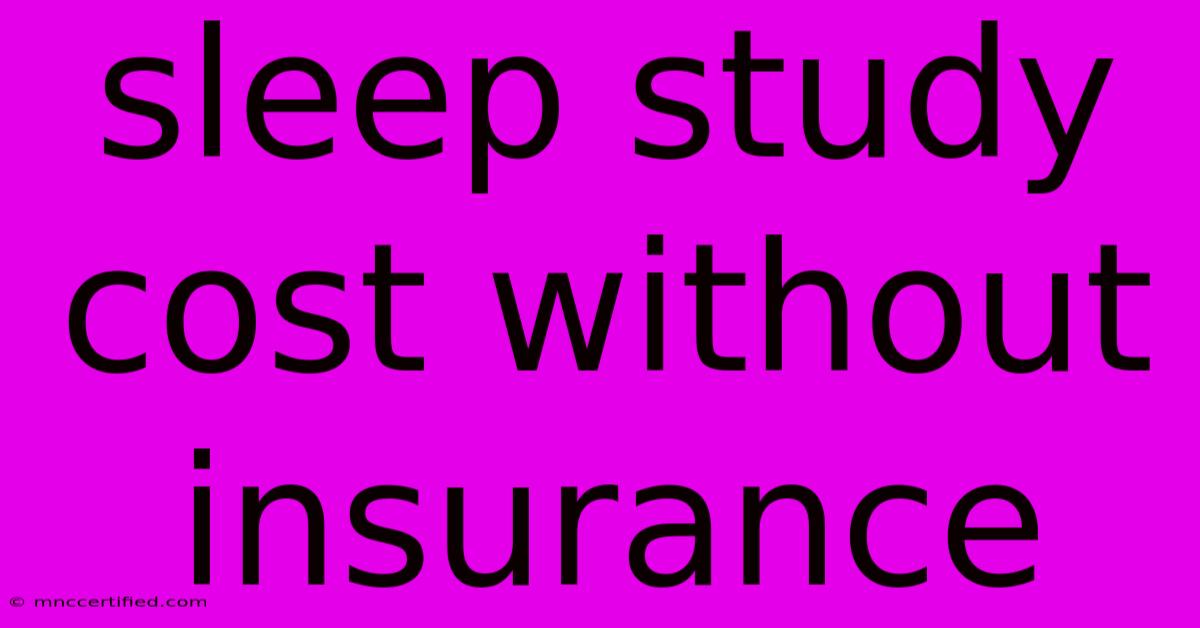Sleep Study Cost Without Insurance

Table of Contents
Sleep Study Cost Without Insurance: A Comprehensive Guide
Are you struggling with sleep problems and considering a sleep study? While a sleep study can provide invaluable insights into your sleep patterns, the cost can be a significant concern, especially if you don't have insurance. In this comprehensive guide, we'll explore the average sleep study cost without insurance, factors that can impact pricing, and alternative options to make this essential diagnostic tool more affordable.
Understanding Sleep Study Costs
The cost of a sleep study can vary widely depending on factors like the type of study, location, and the facility conducting it. Here's a breakdown of the average costs:
- In-Lab Sleep Study: This involves spending the night at a sleep center, where technicians monitor your sleep patterns with various instruments. The average cost for an in-lab sleep study without insurance can range from $1,000 to $3,000.
- Home Sleep Study: This more convenient option involves using a portable device at home to monitor your sleep patterns. The average cost for a home sleep study without insurance typically ranges from $300 to $800.
Factors Influencing Sleep Study Costs
Several factors can influence the final price of your sleep study:
- Type of Sleep Study: The complexity of the study impacts the cost. In-lab studies, which are typically more comprehensive, tend to be more expensive than home sleep studies.
- Location: Costs can vary depending on your location. Urban areas often have higher costs compared to rural areas.
- Facility: The specific sleep center or provider you choose will also affect the cost. Some facilities may offer discounts or payment plans.
- Duration of the Study: The duration of the study, whether it's one night or multiple nights, impacts the cost.
- Additional Testing: Some sleep studies may require additional testing, such as a polysomnography (PSG) or a multiple sleep latency test (MSLT), which can add to the overall cost.
Affordable Options for Sleep Study
While the cost of a sleep study can be a significant hurdle, here are some strategies to make it more affordable:
- Negotiate with the Sleep Center: Don't hesitate to negotiate with the sleep center or provider to explore options like payment plans or discounts.
- Shop Around: Compare prices and services from different sleep centers in your area.
- Consider a Home Sleep Study: If your doctor determines that a home sleep study is appropriate for your needs, it can be a more cost-effective option.
- Utilize Online Resources: Websites like GoodRx can help you find potential discounts or coupons for sleep studies.
Financial Assistance Options
For individuals facing significant financial challenges, consider these options:
- Financial Aid Programs: Some sleep centers or healthcare providers may offer financial assistance programs to eligible individuals.
- Community Health Centers: Community health centers often provide subsidized healthcare services, including sleep studies, to low-income patients.
- Crowdfunding: Platforms like GoFundMe or Kickstarter can allow you to raise funds from friends, family, and the community to cover the cost of your sleep study.
Conclusion
While the cost of a sleep study without insurance can be daunting, it's important to prioritize your health and consider the long-term benefits of diagnosing and treating sleep disorders. By understanding the various factors that impact the price, exploring affordable options, and considering financial assistance programs, you can make this necessary diagnostic tool more accessible.
Remember: If you suspect a sleep disorder, consult your doctor. They can help you determine the most appropriate sleep study and recommend resources for navigating the costs.

Thank you for visiting our website wich cover about Sleep Study Cost Without Insurance. We hope the information provided has been useful to you. Feel free to contact us if you have any questions or need further assistance. See you next time and dont miss to bookmark.
Featured Posts
-
Jamaica Vs Usa Game Time Lineups And Where To Watch
Nov 15, 2024
-
Turbo Crypto Price Prediction 2030
Nov 15, 2024
-
Eagles Vs Commanders Game Time And Broadcast
Nov 15, 2024
-
November 2024 Full Moon Date Time And Viewing Guide
Nov 15, 2024
-
Supermoon Week November 15 22 2024
Nov 15, 2024